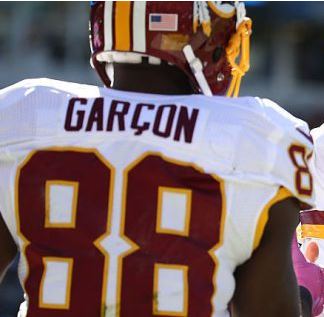Posted on October
25, 2017
No Way, Jose
We don’t need no stinking accent marks
by
Daniel
Clark
If you’ve watched much Major League Baseball this
season, you probably noticed something slightly different about the players’
uniforms. Many of the Hispanic players
have had accent marks added to the names on the backs of their jerseys, as a
collective exercise in celebration of their Latin American heritage. There’s certainly nothing wrong with that, is
there?
Well, yes, there is, insofar as the names on athletes’
jerseys are not meant to be an instrument for the players’ individual
expression. Their purpose is to help the
spectators identify the players. We, in
this country, don’t use accent marks, so the players’ names don’t have any for
as long as they’re here. Not that
there’s any harm done by the accent marks by themselves, and we certainly
wouldn’t expect an equipment manager to deny such a request from a star player. The question is where, and if, it’s going to
end.
 A
less understandable and more annoying example can be found at San Jose State
University, which prints its name on its football uniforms with an accent mark
in “Jose.” These are Americans, running
an American university, named after an American city, and consciously taking a
measure to de-Americanize it. And yes,
this is exactly their intention. This is
a college in the Bay Area, after all.
A
less understandable and more annoying example can be found at San Jose State
University, which prints its name on its football uniforms with an accent mark
in “Jose.” These are Americans, running
an American university, named after an American city, and consciously taking a
measure to de-Americanize it. And yes,
this is exactly their intention. This is
a college in the Bay Area, after all.
Naturally, ESPN has gotten on board, adding accent
marks to the names of Latin American baseball and soccer players on its crawl. This is not on ESPN Deportes,
which specifically caters to a Spanish-speaking audience, but on the four
English language ESPN channels.
Accent marks exist in languages, like Spanish, that
have rules about which syllable in a word is normally emphasized. When there are exceptions to those rules, an
accent mark is used to identify the syllable that receives the emphasis. In our country, we speak a language that has
no such rules. Therefore, we have no
exceptions to any such rules. Therefore,
we don’t need no stinking accent marks.
In hindsight, we set ourselves up for this sort of
linguistic corruption when we accepted the tilde, which in Spanish is never a
character by itself, but is added to the letter “N” to create a whole separate
letter. We have no such letter, so why
do we ever see it in our media? We have
already learned through our familiarity with it that a name spelled “P-E-N-A”
is pronounced “PAY-nya.” We don’t need to expand our alphabet in order
to accommodate it. It’s true that the English
language borrows from lots of other languages, but it only keeps those parts it
finds useful. Accent marks and tildes
are not useful to the English language.
Yet the assumption seems to be that the United States
must adopt any element of any other culture as its own, and to do otherwise is
“nativist”, “xenophobic”, or somehow else bigoted. This is American exceptionalism, liberal
style, according to which only America is not entitled to its own interests, as
all other nations are. Any other country
may exploit its natural resources, except America. Any other country may enforce its borders and
immigration laws, except America. Any
other country is entitled to its own language, except America.
As you might expect, the NFL is in the vanguard of the
movement to put foreign characters on its uniforms. German-born Moritz Boehringer,
who was cut by the Minnesota Vikings just before the start of the season, had
an umlaut over the “O” on his jersey during the preseason. Veteran wide receiver Pierre Garcon, born in
Haiti, wears a jersey with that French bit of phlegm hanging off the letter
“C,” known as a cedilla. Can Chinese
characters be far behind?
It might be tempting to give up and adopt all these
non-English characters in our language, but that’s when liberals will spring
their trap. In an instant, the
accusation will shift from “jingoism” to “cultural appropriation.” How dare you write with accent marks? Don’t you know that you’re stealing the
collective intellectual property of another people? This could even be seen as mockery if it is
done incorrectly, as in mistakenly putting a tilde in “habanero.”
For a culture to change the fundamentals of its
written language is no small hassle. It
would normally only be compelled to do so by a conquering force, which
liberalism must now believe itself to have become. Thankfully, we don’t need to pour cauldrons
of boiling oil on them to make them back away.
All we need to do is say no to them, for once.
The Shinbone: The
Frontier of the Free Press